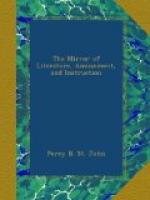to me these words:—“The interest
of France and of my dynasty does violence to my heart—the
divorce has become a rigorous duty to me—I
am the more afflicted by what has happened to Josephine,
because three days ago she must have learned it from
Hortensia—the unhappy obligation which
condemns me to separate myself from her—I
deplore it with all my heart, but I thought she possessed
more strength of character, and I was not prepared
for the bursts of her grief.” In fact, the
emotion which oppressed him, compelled him to make
a long pause between each phrase he uttered, in order
to breathe. His words came from him with labour
and without connexion; his voice was tremulous and
oppressed, and tears moistened his eyes. It really
seemed as if he were beside himself to give so many
details to me, who was so far removed from his councils
and his confidence. The whole of this transaction
did not occupy more than seven or eight minutes.
Napoleon immediately went to seek for Corvisart, queen
Hortensia, Cambaceres, and Fouche; and before he returned
to his apartment, he assured himself of the condition
of Josephine, whom he found more calm and more resigned.
I followed him, and after having recovered my hat,
which I had thrown on the carpet that my motions might
be more free, I retired to the attendance-chamber.
To avoid all kinds of commentaries, I said before
the pages and the ushers that the empress had been
seized with a violent affection of the nerves.
Private Anecdotes of Foreign Courts.
* * * *
*
THE GATHERER.
“I am but a Gatherer and disposer of
other men’s stuff.”—Wotton.
* * * *
*
STORY OF CINDERELLA.
The origin of this nursery tale is sufficiently curious.
About the year 1730, a French actor of equal talent
and wealth, named Thevenard, in passing through the
streets of Paris, observed upon a cobbler’s stall,
the shoe of a female, which struck him by the remarkable
smallness of its size. After admiring it for
some time, he returned to his house; but his thoughts
reverted to the shoe with such intensity, that he
reappeared at the stall the next day; but the cobbler
could give him no other clue to the owner, than that
it had been left in his absence, for the purpose of
being repaired. Day after day did Thevenard return
to his post to watch the re-integration of the slipper,
which proceeded slowly; nor did the proprietor appear
to claim it. Although he had completed the sixtieth
year of his age, so extravagant became his passion
for the unknown fair one, that he became (were it
possible for a Frenchman of that day to be so) melancholy
and miserable. His pain was, however, somewhat
appeased by the avatar of the little foot itself, appertaining
to a pretty and youthful girl in the very humblest
class of life. All distinctions were levelled
at once by love: the actor sought the parents
of the female, procured their consent to the match,
and actually made her his wife.




